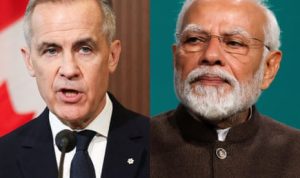UK prime minister and French president among those pressing for de-escalation of conflict with Israel
Middle East crisis – live updates
US politics live – latest updates
European leaders at theG7 summitin Canada are trying to engineer an Iranian return to the negotiating table using Gulf leaders as intermediaries.
But Iran is demanding a joint ceasefire with Israel, while Benjamin Netanyahu, the Israeli prime minister, is resisting the move, andDonald Trumppraised the Israeli campaign, suggesting he did not yet believe it was time to relieve the pressure on Iran.
The US is considered by Iran to be critical to putting pressure onIsrael, but the US president wants indications that Iran will back down on wanting to maintain the right to enrich uranium. He is willing to continue to use the Israeli assault as a bargaining chip if necessary.
French, German and British foreign ministers were due collectively to speak to the Iranian foreign minister, Abbas Araghchi, in an attempt to see ifIranwould meet the US demand to end all uranium enrichment in the country, previously a red line for Tehran.
Asked if he had received any messages from Iran suggesting that it wanted to de-escalate the conflict, Trump hinted that he had. “They want to talk,” he said.
The US president said that Iran was not winning its conflict with Israel and should re-enter negotiations “before it’s too late”.
“They have to make a deal, and it’s painful for both parties, but I’d say Iran is not winning this war, and they should talk, and they should talk immediately, before it’s too late,” Trump told reporters at the summit.
He added: “If Iran wants to negotiate, now is the time.”
Araghchi appealed to Trump to break with Netanyahu, telling the US president he was being played by an Israeli leader who was determined to scuttle a deal that Iran and the US were on the verge of sealing.
He said: “By all indications, the purpose of Netanyahu’s criminal attack on Iran – killing hundreds of innocent civilians, including women and children – is to scuttle a deal between Iran and the US, which we were on the right path to achieve. He is playing yet another American president, and ever more American taxpayers, for absolute fools.
“If President Trump is genuine about diplomacy and interested in stopping this war, next steps are consequential. Israel must halt its aggression, and absent a total cessation of military aggression against us, our responses will continue. It takes one phone call from Washington to muzzle someone like Netanyahu. That may pave the way for a return to diplomacy.”
TheUnited Arab Emirates, the country that sent Trump’s first negotiating offer to Iran, has been one of the intermediaries along with Oman, Qatar and Saudi Arabia.
Oman’s foreign minister, Badr Albusaidi, the previous broker in the US-Iran talks, has been urging Tehran to return to the negotiating table, pointing to the heavily laden military odds against it.
Iranian news agencies reported the president of Iran, Masoud Pezeshkian, had warned the sultan of Oman: “If the United States does not restrain Israel, Iran will be forced to continue its response in a more severe and painful manner.”
Keir Starmer, the UK prime minister; and the French president, Emmanuel Macron, have been in touch with the UAE leadership, and Starmer claimed there was a consensus for de-escalation.
“It is really important that we focus on de-escalation, because the risks of the conflict escalating are obvious across the region and beyond the region, the impact that this could and probably will have on Gaza, which is a tinderbox, and, of course, the impact on the economy. That is why theG7has such a focus on de-escalation. That will be an intense discussion for our talks today … this will be a central issue.”
European leaders at the G7 are warning Iran both directly and via Gulf leaders that Iranian concessions will have to be made at the negotiating table, or Israel is likely to press home its military advantage to the point of securing an end to the Iranian government formed after the revolution in 1979.
With the vast majority of its military and intelligence leadership wiped out by Israel in assassinations, Iran’s decision-making structure is in flux. Even parts of the Iranian foreign ministry in Tehran have been bombed.
European leaders are deeply concerned by doubts over the nature of any successor regime, the prospect of Iran’s breakup and a prolonged conflict that could hit world trade and send oil prices up if Iran’s leaders blocked the strait of Hormuz in a desperate attempt to cling to power.
Iran has claimed it is not interested in building a nuclear bomb, but is not saying it is willing to abandon its right to enrich uranium, the red line that the Iranian foreign minister insisted on throughout the talks with the US.
The coincidence of the G7 meeting happening during the escalation in the Iran crisis has provided European leaders with an opportunity to try to reimpose themselves in the Iran negotiations from which they have been largely excluded by the US since Trump returned to the White House.
Between 2013 and 2025 the three European powers of the UK,Franceand Germany had been ever-present in the negotiations with Iran.
The G7 leaders are also preparing a joint statement on the Iran-Israel crisis, but Trump has so far refused to sign it.
At issue has been whether any joint statement calling for a return to diplomacy and ruling out Iran ever possessing nuclear weapons goes further by calling for a ceasefire. Some states wanted to hint at criticism of Israel for upending the US and Iranian negotiations that were due to have continued on Sunday.
But G7 member states are divided, with Japan’s prime minister, Shigeru Ishiba, on Friday sharply criticising Israel’s recent military assaults on Iran, labelling the attacks “totally intolerable” and “extremely regrettable” amid rising tensions in the region.





















